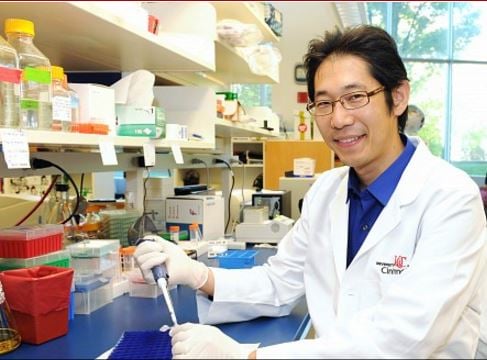If you got behind the wheel of your vehicle to find that the fuel gauge had mysteriously disappeared, would you still drive it? University of Cincinnati researchers are studying a creative approach to fighting tumors that involves disabling cancer cells' energy resource sensors to stop them from proliferating.
Cancer cells primarily use a type of chemical energy called guanosine triphosphate (GTP). Like its more well known cousin adenosine triphosphate (ATP), GTP stores energy in the powerful phosphate bonds and releases energy when the body needs it. Unlike ATP, which fulfills most of a normal cell's energy needs, GTP helps fuel protein synthesis and cell signaling. In a tumor, GTP levels are elevated and the cells use lots of GTP as ordinary fuel.
Atsuo Sasaki, assistant professor in the Division of Hematology and Oncology at the UC College of Medicine and researcher at the Brain Tumor Center, is leading a study with the goal of stopping the division of cancer cells by interfering with their ability to sense available energy resources. "Energy sensing is vital to the successful proliferation of cancer cells,” says Sasaki. "A large amount of GTP is required in rapidly-dividing cells, and cells need to know that the fuel is available to them."

(Professor Atsuo Sasaki, courtesy UC)
Sasaki and his team found the enzyme responsible for GTP sensing, known as PI5P4Kβ. Furthermore, they created mutant cancer cells without PI5P4Kβ to test their proliferation. Like a conservatively safe driver, the tumor assumed that it had no fuel available and chose not to proceed. As a result, the tumor didn’t grow at all.
The proposed next step is to deactivate the enzyme in existing tumors to trick them into stagnancy. In Sasaki’s words, "By unveiling PI5P4Kβ’s role as a GTP sensor, we now have a potential new therapeutic target for patients. If we can find drugs that stop PI5P4Kβ from acting as the fuel indicator, we could get these aggressive and tragic cancers into energy-depleted status.” In particular, Sasaki is optimistic about treating notoriously resilient cancers, like the brain cancer glioblastoma multiforme, and cancers that have metastasized to the brain.
Sasaki's work was funded by a five year, $1.67 million grant awarded by the National Institutes of Health (NIH) in 2014. If funding information for the research at UC interests you, consider reading our free University of Cincinnati Funding Stats and Vendor Show Info report, accessible here:
If you are a research scientist or lab supplier interested in networking with others in your field at University of Cincinnati, Biotechnology Calendar, Inc. invites you to attend our annual Cincinnati BioResearch Product Faire™ Event, coming up next year on October 7th, 2016 on the UC campus. We will also be holding our BioResearch Product Faire™ Event at Ohio State University the day before, October 6th, 2016. Biotechnology Calendar, Inc. is a full-service science research marketing and events-planning company that hosts events at top research institutions nationwide. If you are interested in attending this show, please click the button below. Otherwise, we encourage you to check out our 2016 schedule of events for a more complete geographical selection.


